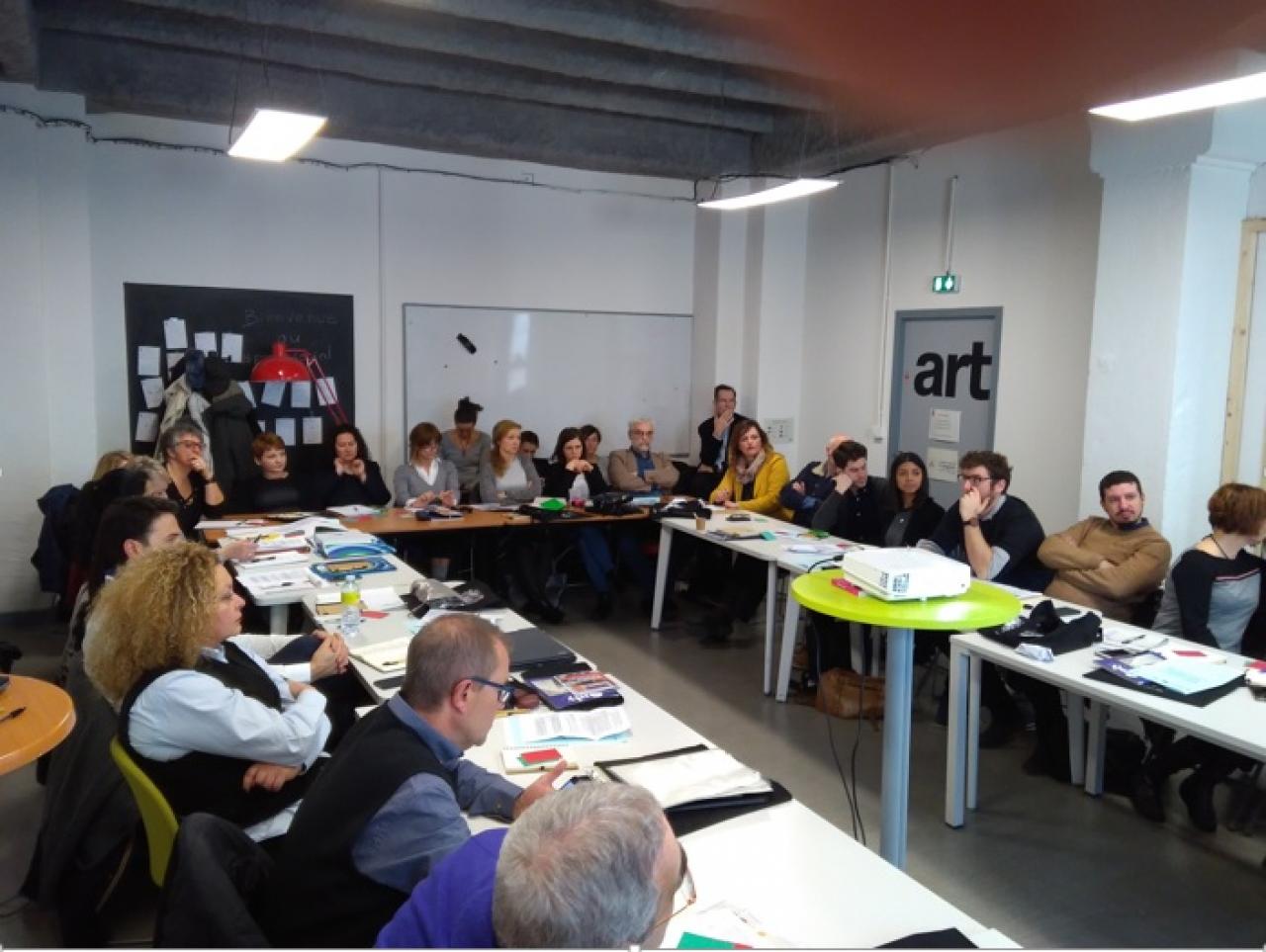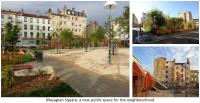
by Corinne Hooge - Grand Lyon Project Manager
Setting up efficient indicators and monitoring systems to measure performance The URBinclusion project held its first thematic seminar in Lyon on the 11th and 12th January 2018.
The URBinclusion project held its first thematic seminar in Lyon on the 11th and 12th January 2018. This meeting gathered 23 members of the URBInclusion Cities, 2 Urbact experts, 2 local experts in evaluation and 16 members of the Lyon urban local group.
The meeting was about sharing a common culture and building capacity on monitoring and evaluation. Its objective was to enable partner Cities to go further with their Implementation plan.
DAY 1
On day1, we met in “le Centsept”, a social innovation centre facilitating the acceleration of projects responding to the inhabitants’ needs (jobs, mobility, disability, housing, health, environment …). It gathers social entrepreneurs, companies, local authorities and experts.
Thibault Desjoncquères and Domitille Hamard gave the network Cities a vibrant training session about evaluation and monitoring. Following this section cities presented their experiences on monitoring and evaluation activities. (For further details about this two previous sections, please refer to the URBinclusion following article)
Study visit
Day 1 ended with the visit of the urban project in “the Guillotière”district in Lyon.


DAY 2
On day 2 the URBInclusion network was hosted by the municipality of Saint-Fons in the Town Hall. Nathalie Frier, Mayor of Saint-Fons, welcomed the delegation and insisted on how these European exchanges are important for the municipality that faces many social challenges. There are lots to learn from the other Cities, she argued.
The greater part of the morning consisted of the presentation of few local actions linked to URBInclusion
How to renew social work for a better relationship with families?
Fabien Trévisan, Social development special advisor, Lyon Metropolis and Pierre Vidal-Naquet (sociologist - Lyon 2 University) presented the action-research on how to renew social work for a better relationship with families. Social workers face complex situations due to an increasing disparity of parenting styles. Indeed, they express difficulties in the exercise of their duties, especially for the support of the parenthood (the role of each parent varies significantly from one culture to the other).
Thanks to a fruitful dialogue between social workers and sociologists about problem situations, they produced a shared analysis of practices. This approach was completed by observation work and individual interviews. We made good use of this material to co-produce “stories” and draw up a comic book, in order to share difficulties and diagnosis with a larger audience (other social workers, hierarchy, partners …). Simultaneously social-psychologists and social workers involved in the initiative co-produced innovative methods and operational tools to help the relationships between professionals and families. These tools are being “tested” for real in the Vénissieux Social Centre. If the experiment is a success it will be wider spread out.
Social clauses: a tool to integrate vulnerable people into working life
Denis Compingt, Director of social life in Grand Lyon Habitat, presented how public procurement is an efficient lever to help unemployed people to find a job. In 2015 the Lyon Metropolis adopted the Metropolitan Inclusion Programme for Employment. The core objective of this programme is to better link economic and employment strategies. Developing social clauses is one of the tools developed to reach this goal. Social clauses are aimed at people suffering from long-term unemployment (breaks in working career) but capable for work. This programme gives them a little help to renew with the labour market. In 2016 the Lyon Metropolis involved in the social clauses programme offered 499 473 working hours to 1810 people (328 full-time equivalent). The contract duration is in average 2 months.
Social housing companies are strongly involved in the social clauses programme. In 2016 the 3 companies offered 288 893 social working hours (165 full-time equivalent). Nevertheless, the housing companies’ commitment has limits: the link is hard to establish between this kind of jobs and the poorest areas of the metropolis. It is also difficult to target the programme on specific social residence. Also, the kind of job they can offer is unrelated to the companies’ core business, running social housing. However their commitment is continuing because the increase of precariousness brings many problems: housing eviction risk (unpaid rents), difficulties to manage the buildings, etc. Thus the 3 housing companies decided to set-up a common platform for jobs, in order to reinforce the impact of the initiative. This platform is being currently developed in Vénissieux Les Minguettes.
Visit of the Social grocery
Cécile Fau, director of the “Espace créateur de solidarités” / “the Space for Solidarity Making”, hosted the URBInclusion network for lunch and presented how the association offers a global social support for vulnerable people and generates solidarity links in the neighbourhood. Its objectives are to facilitate access to fundamental rights, to provide the means for greater autonomy and to reduce inequalities. The association relies on a team of multidisciplinary professionals, who implement a set of actions aiming at the development or consolidation of social ties through exchanges and sharing. It runs a social grocery, local community gardens, a recycling and upcycling shop, and a tool library. Member families in needs can access to good food and products at a very low price (food banks donations …). They can also join collective actions, like gardening workshops (to renew with raw products), DIY (tool library), cultural activities … The association also offers social jobs for people in benefits. To enable these exchanges of ideas, knowledge and skills, the association is open to all. For instance, ordinary families can also buy local quality products, mainly organic, but at market price. Therefore, the Space for Solidarity Making seeks to encourage the emergence of solidarity initiatives among the inhabitants.
Conclusion and next steps
The project co-ordinator Txema Castiella, the Urbact lead-expert Fernando Barreiro thanked the Lyon Métropolis for the hospitality and for the design of this first thematic meeting. The format of the agenda, the quality of the presentations and workshop sessions facilitated by Thibault Desjoncquères and Domitille Hamard helped to gain in skills and share a common culture.
The next meeting will take place in Krakow on the 19th and 20th of April 2018. It will be a transversal meeting.
We also had fun! Two KAHOOT! sessions with some rewards for Naples, Copenhagen, Krakow, and Turin. And one birthday song for Theodora (Trikala).

